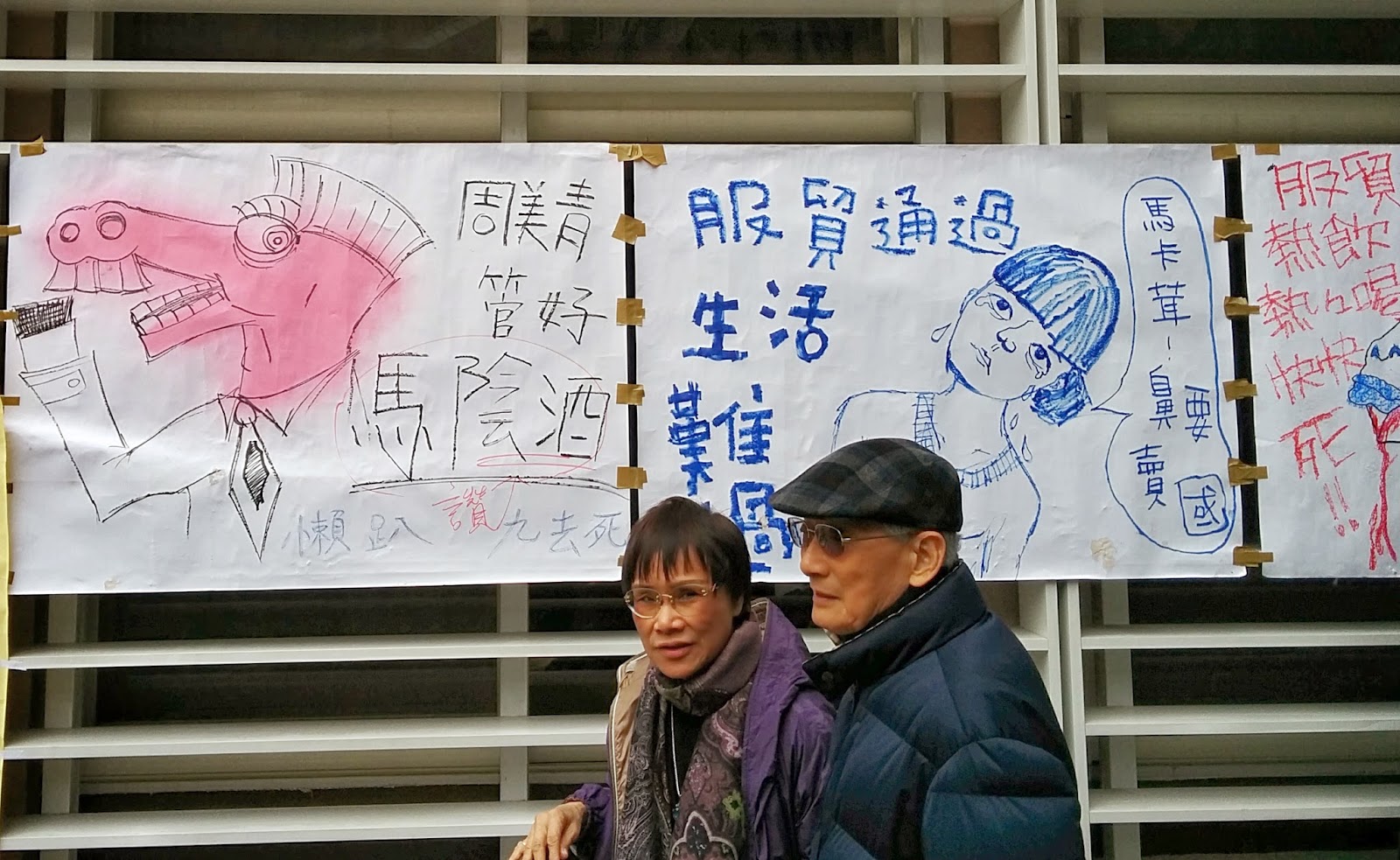Taiwan’s “Occupy” Movement Teeters between Peace and Violence
台灣的"占領運動"擺盪於和平與暴力之間
By Sandra Upson
In the biggest student-led protest in Taiwan’s history, an estimated 10,000 people have surrounded government buildings in Taipei in opposition to an impending trade deal with mainland China. The movement began spontaneously, when hundreds of protestors seized control of Taiwan’s main legislative building last Tuesday night. On Sunday evening the clashes escalated, with several dozen people injured in skirmishes between police and activists who had stormed the Executive Yuan, which houses the Cabinet.
Yet when I visited the protests on Saturday, I was struck by the extraordinary civility and peacefulness on display. The students, professors and other supporters sat in neat rows in the streets flanking the occupied legislative building. Many attendees carried sunflowers, a salute to the event’s nickname, the Sunflower Movement.
Protesters here are objecting to a move by Taiwan’s leading party to skip an itemized review of the trade agreement, as had been promised. The new pact would open up Taiwan’s service sector to Chinese investment, raising fears that the mainland will increase its leverage over the island. Businesses in the service sector make up almost 70 percent of Taiwan’s economy. Some protesters oppose the pact entirely, whereas others object to the way the government is pushing it forward without a public review.
The deal comes on the heels of a half-decade of warming relations between the Taiwanese government and mainland China. Only in 2008 did Taiwan begin to allow direct travel, trade and postal connections with China. Previously, all such links were routed through a third party, often Hong Kong. To get just a taste of Taiwan’s historically fierce protection of its sovereignty from China, consider that it only permits ten mainland films to be released in the island per year, a quota applied exclusively to its neighbor across the strait. This trade agreement will likely increase that figure.
On Saturday, the thousands upon thousands of young Taiwanese people sitting in the streets were quiet and friendly. Volunteers amiably but firmly kept walkways clear around the site. Upon exiting a port-a-potty, you could expect to find a volunteer offering to pour bottled water over your hands. Nearby businesses offered free snacks.
Protesters who had entered the legislative building were sitting on its roof and peering out its windows. Police maintained a very low profile—the most visible presence was at the Executive Yuan, around the corner, where several tiers of barbed wire stood between the police and pedestrians. Thorny fencing also guarded parts of the legislative building, but to less effect. Here, protestors had wrapped cushioning around the sharp edges and tucked sunflowers between its wires.
在這場臺灣史上規模最大、由學生帶領的抗議活動,將近一萬人在臺北包圍了政府機構,為的是反對即將和中國大陸簽署的貿易協議。這次的抗議活動是自發性的,事件始於上星期二晚間,數百名抗議群眾攻占臺灣的中央立法機關。星期日晚上抗議情勢升溫,警方和突襲行政院(內閣)的抗議人民數度爆發肢體衝突,造成數十人受傷。
然而當我星期六來到抗議現場時,民眾的文明舉止以及在場的平和氛圍令我為之震撼。這些學生、教授和其他支持者一排排整齊的靜坐在立法院的兩側街道上。其中許多參加者帶著太陽花,象徵對這場"太陽花學運"的致敬。
抗議的起因為台灣執政黨並未依照先前承諾,直接跳過對此貿易協議逐條審查的程序。這項協議將開放大陸投資台灣的服務業,引起民間的恐慌,深怕此舉會提高大陸對台灣的影響力,因為服務業幾乎佔台灣GDP(國內生產毛額)70%左右(註1)。部分抗議人士堅決反對此協議,有些人則是反對政府黑箱作業強行通過的方式。

大約五年前兩岸關係較為溫和後該協議即達成(註2),但直到2008年台灣才開放和中國大陸在旅遊、貿易、郵政上的直接往來。在這之前,所有這些相關交流皆須透過第三方管道協助,通常由香港媒合。如欲明白台灣多年來捍衛其國家主權至何程度,從其每年只允許十部大陸電影在台發行便可略知一二。這樣的額度是位於對岸的鄰國所獨享的,若此貿易協定通過則有提高的可能。
星期六那天,數以萬計在街頭席地而坐的台灣青年是平靜而友善的。志願者親切而堅定地維護抗議現場附近人行道的暢通,甚至當你由流動廁所走出時,他們會用瓶裝水幫你洗手。附近還有商家免費提供小吃。
進入立法院的抗爭者有些人坐在屋頂上,有些窺視著窗外。警方行事仍保持低調-唯一顯眼的只有在行政院附近,將行人和警力層層隔開的鐵絲網。立法院周邊也有部分架設拒馬,但效果不彰。抗議民眾將其尖銳部分包裹住,並在鐵絲網點綴上太陽花。
註:
- Taiwan GDP = agriculture 農業 2%,industry 工業 29.4%,services 服務業 68.6% (2013 est.) (資料來自CIA)
- Cross-Strait Service Trade Agreement (海峽兩岸服務貿易協議) is a major follow up of the Economic Cooperation Framework Agreement (海峽兩岸經濟合作架構協議,ECFA) signed on 29 June 2010 in Chongqing. 服貿從屬於2010.6.29在大陸重慶省簽訂的ECFA (Wikipedia)
此評論刊登於美國《科學人》雜誌 (
Scientific American)
文章連結
http://blogs.scientificamerican.com/observations/2014/03/24/taiwans-occupy-movement-teeters-between-peace-and-violence/





